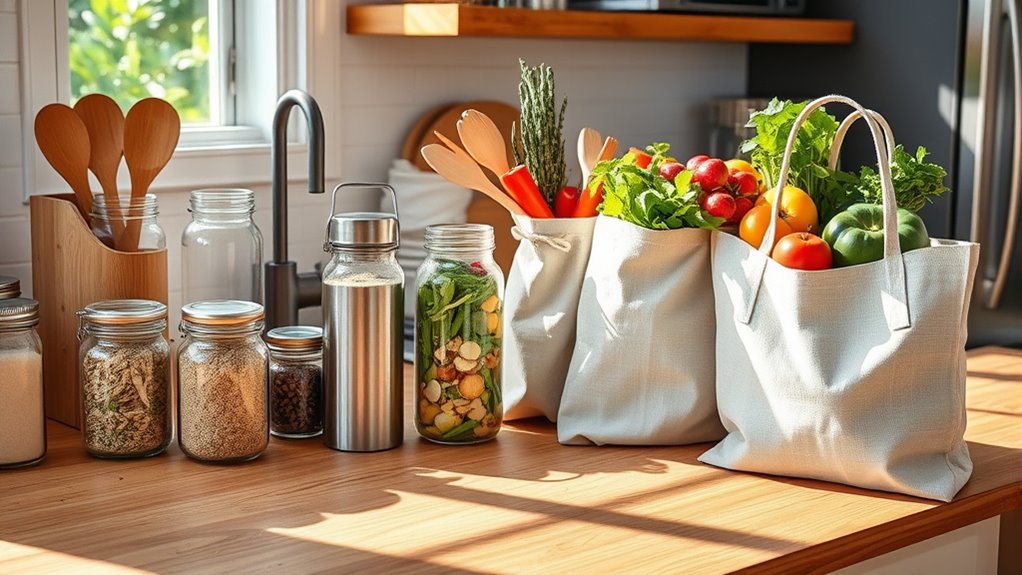To start a zero-waste lifestyle, begin by evaluating your current habits through a waste audit to identify areas for improvement. Set small, achievable goals and focus on reducing single-use items by choosing reusable bags, containers, and opting for bulk shopping. Practice proper composting and recycling to manage waste effectively. Building a supportive community can keep you motivated. Keep exploring new strategies—you’ll find plenty of tips to help make sustainable living easier and more natural.
Key Takeaways
- Conduct a waste audit to identify major waste sources and habits needing change.
- Set achievable, small-scale zero-waste goals aligned with your current lifestyle.
- Prioritize reducing single-use items by using reusable bags, containers, and cups.
- Incorporate composting and recycling correctly based on local guidelines.
- Build community connections through local events, workshops, and social media to stay motivated.
Assess Your Current Waste Habits
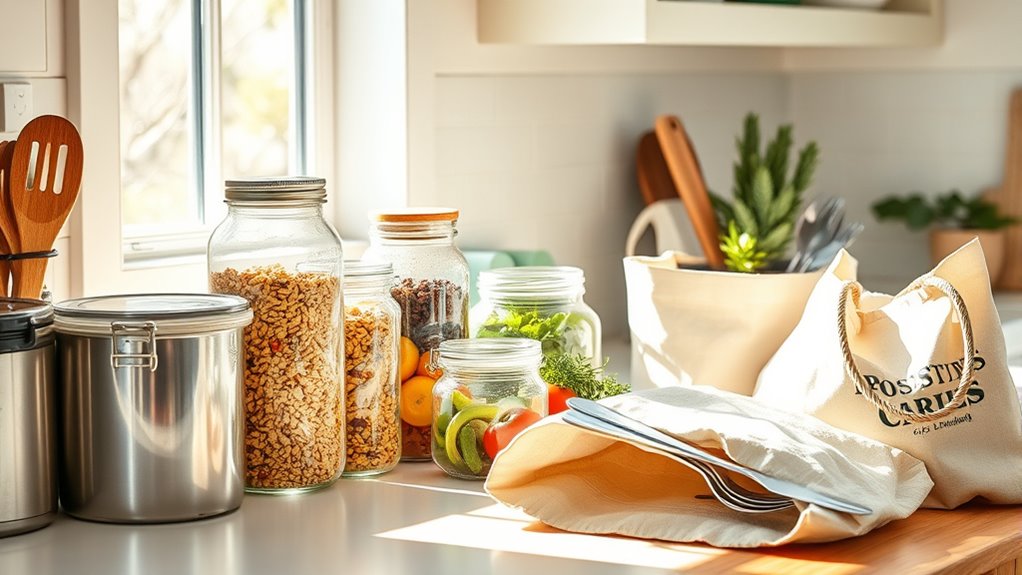
To begin your journey toward a zero-waste lifestyle, you need to understand your current waste habits. Start with a waste audit: gather all the trash you generate over a week and sort it into categories like plastics, paper, food scraps, and packaging. This habits analysis reveals what you throw away most often and highlights patterns you might not notice daily. Be honest and detailed; tracking your waste helps identify unnecessary disposables and areas for improvement. Recognizing these habits allows you to make targeted changes, such as reducing single-use plastics or composting food scraps. Remember, this step isn’t about perfection but gaining awareness. The insights from your waste audit will be the foundation for building sustainable, zero-waste practices.
Set Realistic Zero-Waste Goals
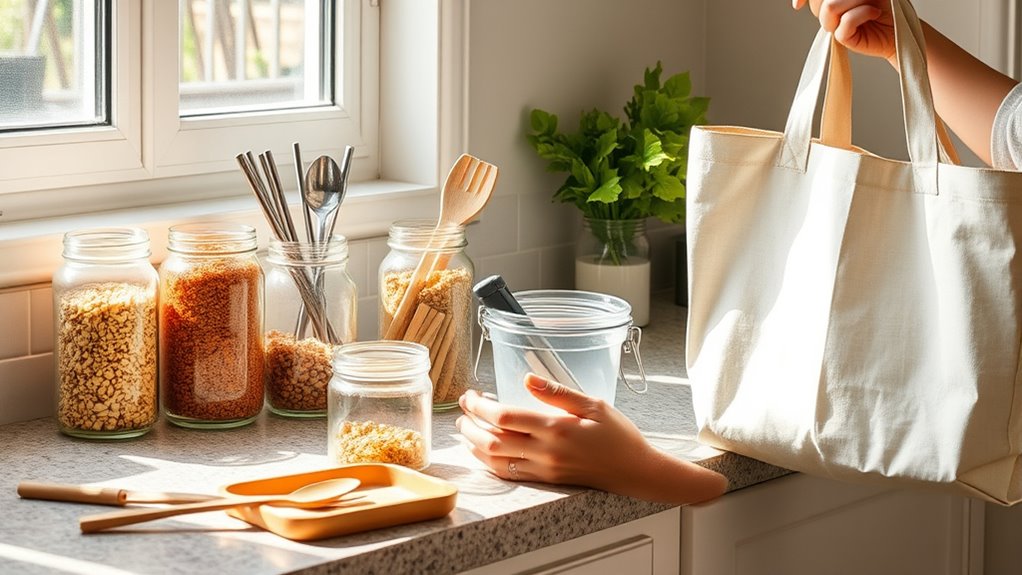
How can you make your zero-waste journey manageable? Start by setting realistic goals that match your lifestyle. Avoid falling for recycling myths that suggest everything is recyclable; focus instead on reducing and composting techniques. Break big ambitions into smaller steps, like cutting plastic use or learning proper composting methods. Keep your goals specific and achievable to stay motivated. Consider these tips:
Set realistic, achievable zero-waste goals to stay motivated and make progress manageable.
- Prioritize reducing waste over perfection
- Educate yourself on recycling myths and composting techniques
- Track your progress regularly
- Celebrate small wins to stay motivated
- Adjust goals as you learn and grow
- Remember that understanding Gold IRA Rollovers can help diversify your investments and provide long-term financial security.
Focus on Reducing Single-Use Items
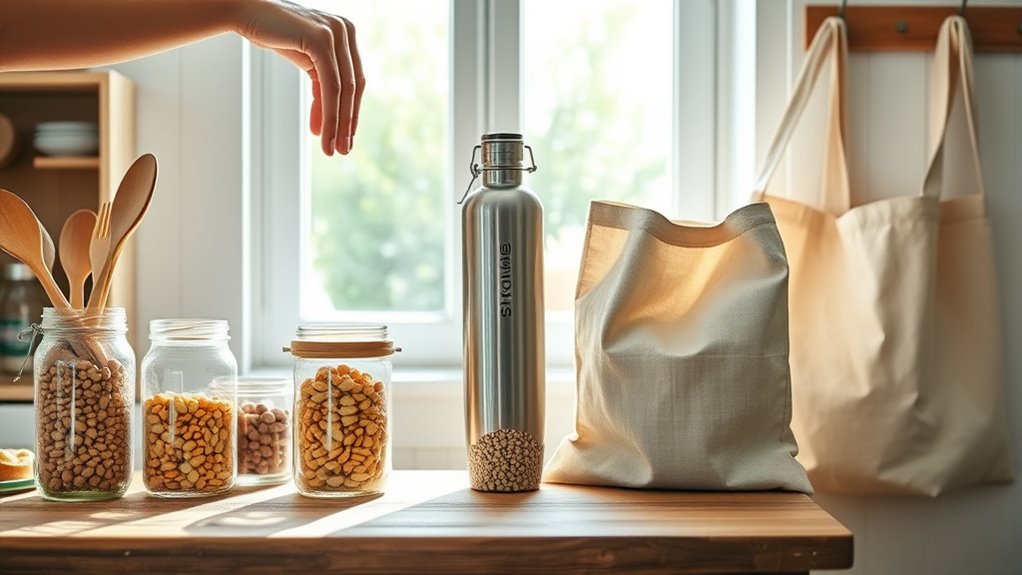
You can substantially cut waste by swapping disposable cups for reusable ones and always carrying your own bags. Choosing bulk products reduces packaging and minimizes trash. Small changes like these make a big difference in living a zero-waste lifestyle. Additionally, considering options like electric bikes for commuting can further reduce carbon emissions and reliance on single-use transportation fuels.
Swap Disposable Cups
Swapping disposable cups for reusable alternatives is one of the simplest yet most impactful ways to reduce single-use waste. By choosing reusable cup options, you cut down on the tons of waste generated annually. These disposable cup alternatives are often stylish, durable, and eco-friendly, making them easy to carry and use daily. When selecting a reusable cup, consider factors like insulation, size, and material to suit your lifestyle and preferences. Using sustainable materials in your reusable cup can further enhance your eco-friendly efforts.
- Reduce waste and landfill contributions
- Save money over time with reusable options
- Minimize environmental impact
- Promote sustainable habits
- Inspire others to follow suit
Switching to reusable cups not only benefits the planet but also encourages a mindset of mindful consumption, helping you contribute to a greener future.
Use Reusable Bags
Have you ever considered how much waste is generated by single-use plastic bags? Switching to reusable bags is a simple way to cut down on unnecessary waste. Look for bags made from eco friendly fabrics, like organic cotton or recycled materials, to further reduce your environmental impact. Keep your reusable bags organized in your car or near your door so they’re always ready when you need them. This habit encourages consistent use and helps eliminate the temptation to grab disposable bags. Additionally, craft and textiles offer a variety of sustainable bag options that can be stylish and durable. By making this small change, you not only reduce plastic waste but also promote a zero-waste lifestyle. With a little planning, reusable bags become an effortless part of your routine, making your shopping trips more sustainable and eco-conscious.
Choose Bulk Products
Opting for bulk products is a straightforward way to cut down on single-use packaging and reduce overall waste. When you buy in bulk, you minimize reliance on plastic packaging and embrace packaging alternatives like glass jars, cloth bags, or paper containers. This not only lessens plastic waste but also encourages more sustainable shopping habits. Additionally, understanding the production quantity variance can help businesses optimize inventory levels, reducing waste from overproduction.
Embrace Reusable Alternatives

Switching to reusable bags and containers makes a big difference in reducing waste. You can easily bring your own bags to the store and choose reusable options for leftovers. These simple swaps help you cut down on single-use plastics and live more sustainably. Incorporating wall organization systems can also help keep your storage areas tidy and encourage reuse of containers.
Switch to Reusable Bags
Using reusable bags instead of single-use plastic ones is a simple yet impactful way to reduce waste. When you choose eco-friendly shopping, you lower your plastic waste footprint and contribute to a healthier environment. Carrying your own bags encourages mindful consumption and supports sustainability efforts. Remember, every bag reused makes a difference. Incorporating durable and beneficial ingredients like collagen and hyaluronic acid into your routine can also enhance your skin’s appearance over time.
Opt for Reusable Containers
Choosing reusable containers instead of disposable ones makes a noticeable difference in reducing waste. Plastic packaging often ends up in landfills or oceans, harming the environment. By switching to reusable containers, you cut down on single-use plastic and minimize your ecological footprint. Use glass or stainless steel containers for meals, snacks, and leftovers—they’re durable and easy to clean. Not only do they eliminate the need for plastic packaging, but they also keep your food fresh without adding waste. Keep a set in your kitchen and take them with you for picnics or takeout. This simple switch encourages a zero-waste lifestyle and helps reduce the demand for disposable plastics. Embracing reusable containers is an effective, sustainable choice that benefits both you and the planet. Reducing plastic waste is a crucial step toward protecting our environment and promoting sustainability.
Shop Mindfully and Bulk Buy
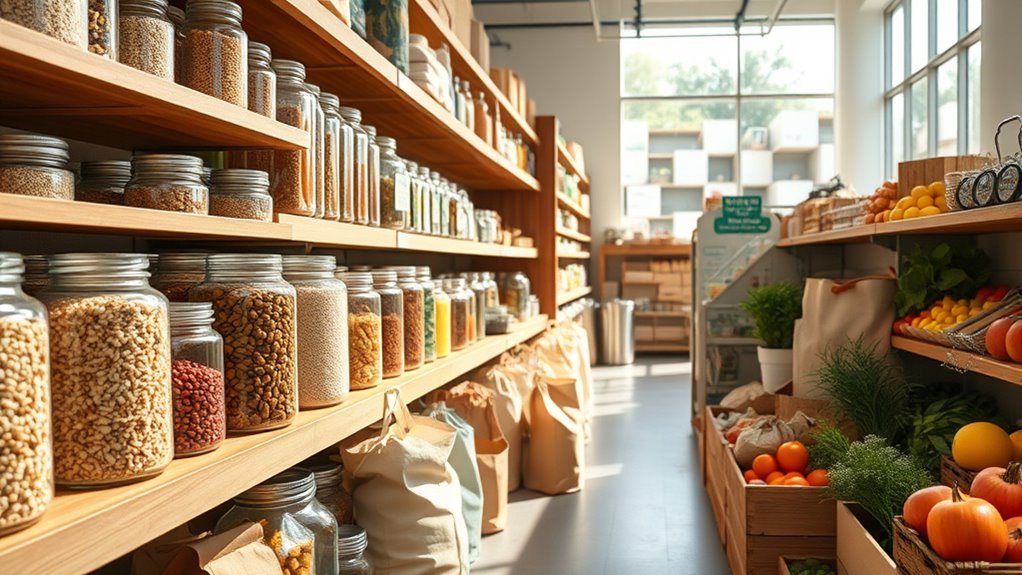
Shopping mindfully and buying in bulk are powerful ways to reduce waste and minimize packaging. By choosing products with minimal or plastic-free packaging, you cut down on unnecessary plastic packaging and packaging waste. Bring your own containers or bags to stores, and select items sold in bulk to avoid single-use packaging. This approach not only saves money but also decreases your environmental footprint. Remember, small changes add up over time. Keep these principles in mind:
Choose unpackaged and bulk items, bring reusable containers, and support sustainable brands to reduce waste and packaging.
- Opt for loose, unpackaged produce when possible
- Use reusable bags and containers instead of plastic ones
- Visit bulk stores to buy only what you need
- Read labels carefully to avoid excessive packaging
- Support brands committed to sustainable packaging practices
- Incorporate sustainable shopping habits into your routine to further reduce waste.
Making mindful choices assures you contribute to a zero-waste lifestyle.
Compost and Recycle Properly
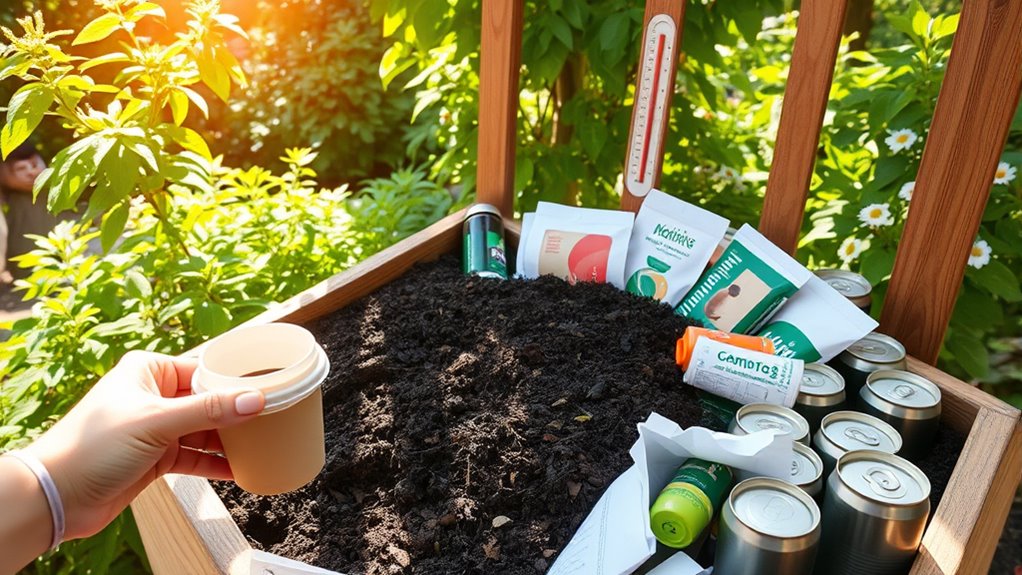
Building on your efforts to reduce packaging waste, proper composting and recycling turn household waste into valuable resources rather than trash. Use compost bins to collect organic waste like food scraps and yard waste, ensuring it decomposes quickly and safely. When recycling, pay attention to recycling symbols on packaging; these symbols indicate whether materials are recyclable and how to sort them correctly. Rinse containers to prevent contamination and follow local guidelines for disposal. Proper recycling minimizes landfill overflow and conserves natural resources. Remember, not all plastics are recyclable, so check symbols carefully. Understanding recyclability helps ensure you’re sorting waste correctly and making the most sustainable choices. Composting and recycling properly help close the loop, reduce waste, and support a sustainable lifestyle. Small consistent actions make a significant impact on your zero-waste journey.
Build a Supportive Community
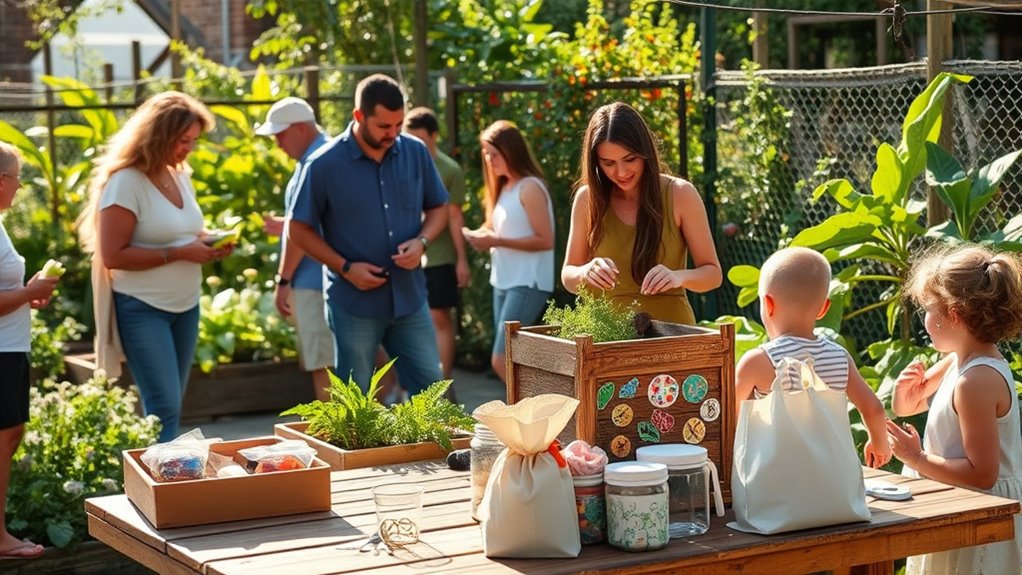
Creating a supportive community is essential for sustaining your zero-waste lifestyle because shared knowledge and encouragement make the journey easier and more rewarding. Engage in community outreach and participate in local events to connect with like-minded people. Building relationships helps you stay motivated and exchange practical tips. Consider joining or forming local groups focused on zero-waste practices, which foster accountability and inspiration.
Remember:
- Attend local workshops and markets to learn new strategies
- Share resources and bulk buying opportunities
- Collaborate on community clean-up projects
- Support local zero-waste stores and initiatives
- Use social media to find and connect with local zero-waste advocates
A strong community boosts your confidence and deepens your commitment.
Frequently Asked Questions
How Do I Handle Zero-Waste Challenges While Traveling?
When facing zero-waste challenges while traveling, you can stay eco-friendly by packing travel-friendly utensils and reusable containers. Always carry a set of reusable utensils to avoid single-use plastics at cafes or takeout spots. Use your containers for leftovers or snacks, reducing waste. Planning ahead helps you find eco-conscious options and stay committed to your zero-waste goals, even on the go. This way, you enjoy your trip responsibly.
What Are Beginner-Friendly Zero-Waste Products to Start With?
Starting your zero-waste journey might seem overwhelming, but beginner-friendly products make it easier. Think of reusable containers and compostable utensils as your first allies—practical yet eco-friendly. They replace single-use plastics and help you cut waste effortlessly. These simple switches empower you to reduce your environmental impact daily, turning small changes into a powerful lifestyle shift. With these essentials, you’re already making a positive difference for the planet.
How Can I Motivate Others to Adopt a Zero-Waste Lifestyle?
You can motivate others by sharing your success stories and emphasizing community support. Show how small changes made a big difference in your life, inspiring them to try zero waste. Encourage conversations, offer practical tips, and celebrate progress together. When people see the positive impact and feel supported, they’re more likely to join in. Your enthusiasm and shared experiences can create a ripple effect, making zero waste a collective effort.
Are There Any Financial Benefits to Going Zero-Waste?
You’ll find that going zero-waste can lead to significant cost savings over time. By reducing your reliance on disposable items and packaging, you save money on constantly buying new products. Plus, using reusable containers and buying in bulk can lower your expenses. Consider budget tips like prioritizing quality over quantity and avoiding impulse purchases. These small changes not only help the environment but also keep more money in your wallet.
How Do I Deal With Zero-Waste Setbacks or Slip-Ups?
Sometimes, setbacks happen when you least expect them. It’s a coincidence that reminds you that progress isn’t linear. When slip-ups occur, practice mindful reflection to understand what caused them without judgment. Set realistic expectations, knowing that perfection isn’t the goal—consistency is. Every mistake is a learning opportunity that brings you closer to your zero-waste lifestyle. Keep moving forward, and remember, persistence outweighs perfection.
Conclusion
Starting your zero-waste journey is like planting a seed—you’ll see small changes grow into a sustainable lifestyle. Remember to assess your habits, set achievable goals, and embrace reusable options. Every step, no matter how tiny, makes a difference. With patience and persistence, you’ll create a positive impact on the planet. Stay committed, find support, and enjoy the journey ahead—it’s worth it, just like a garden blooming after careful tending.
